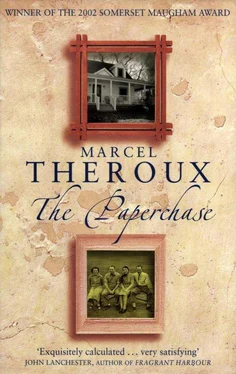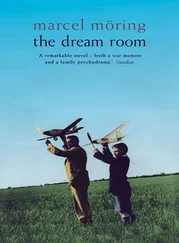The fact that Patrick had visited London came as a revelation. I didn’t recall his ever mentioning it. I knew he had travelled in Europe — the rest of the photos were snaps of various European capitals, and blurry ones that looked like they had been taken out of a train window (Poland? Russia?) — and I suppose that would make a visit to London inevitable, but neither he nor my father had ever said anything about it.
It was only a glimpse into a single afternoon of three lives, but it implied that the dimensions of my ignorance were vast.
For a few days, I got so caught up thinking about the past that I stopped paying attention to the present. When I came back to myself, it was with the dawning realisation that coming to Ionia had led me to a dead end. It wasn’t a flash of insight — a conversion — but something more slow-growing and deeply rooted: I couldn’t stay. Sooner rather than later, I knew I would have to move forward and that meant leaving the island. What I didn’t — couldn’t — foresee was that going forward would just lead me more circuitously into the past.
AT THE BEGINNING, when I wasn’t painting, I found myself odd jobs to do: I rooted around in the shed, planted vegetables and put up a bird feeder in Patrick’s Japanese maple tree. I harvested pears and peaches from my orchard and delivered some in a brown paper-bag to the Fernshaws with a note thanking them for their help on the day of my arrival. There was no one at home, so I left the bag on the steps of their house. I occasionally passed Nathan selling lemonade on the empty highway as I drove back and forth to the Colonial Market for milk and newspapers.
I made a point of stopping every time. He was unfailingly rude, which I began to enjoy in a strange way. It became one of the reliable features of my routine. I always pretended not to notice, and chatted happily to him when I pulled up to buy his lemonade. He never took off his headphones, but served me with the music leaking out of them into the sunshine.
My proprietorial zest for my new home soon waned. I found living in the house even more uncomfortable than I had anticipated. To stay there with time on your hands was to get sucked into the unwinnable war against entropy that Patrick had been waging halfheartedly for years. For every one thing I fixed, two more seemed to break. Or, the quest for the right tool would take me to another part of the house where I would uncover worse damp, more dangerous wiring, or an impassable mountain of crockery that had been stacked up because the cabinet it was intended for needed fixing.
If I was careful, the situation wouldn’t get any worse, but improvements were pretty much out of the question. House and owner had found themselves in a kind of stalemate between order and chaos and things had stayed that way for years. There might have been occasional skirmishes (grass-cutting, cleaning windows, taking trash to the dump), but no significant exchanges of territory.
Even though I intended to leave before the summer was up, I wanted to postpone my departure at least until I’d finished my first painting. It was also a way of deferring making a decision. I knew I needed time to figure out what to do next. If I went back to London, I would have nowhere to live until Mr Bakatin’s lease expired.
As a result, there wasn’t much incentive to work quickly. But I didn’t fully share Patrick’s talent for procrastination, and one Friday lunchtime in early August, I finished my picture. I hung it up in the summer kitchen; hammering the nail in gave me an illicit thrill. What would Mr Blair of the churchmen’s fund have to say about that? I wondered.
But standing back to look at the completed painting, I felt deflated. It could have been any stretch of coastal Massachusetts. It lacked the sense of menace that I felt up on the widow’s walk, where the disparity between the size of the ocean and the size of the island suddenly became clear.
I gave myself the rest of the day off — which meant a day away from the house. Getting out of the house was a little like coming off a nuclear submarine. Leaving my clothes at the laundromat in the local mini-mall, I was struck by its spaciousness and efficiency. Opening the washing machine, I half expected to be confronted by a collection of baseball cards, or a crate of empty jelly jars. Two weeks in Patrick’s house would have made a minimalist out of anyone. I wanted to spend an afternoon in an air-conditioned shopping mall, surrounded by clean glass and the smell of new sneakers.
The sky was clouding over as I drove into Westwich. The road curved past a handful of shingled houses, and for a couple of miles it was shaded with trees. These, and the stone walls that divided up the cleared land into fields, made me think of the Kent countryside — where many of the island’s first settlers had come from. There were still some orchards, but little of the countryside was agricultural. Some of the smaller houses had boats or lobster traps outside them, but the real income of the island came from tourists.
The islanders bitched about them — they drove too slowly or they drove too fast; they had too much money; they spoiled the views with obscenely large holiday homes — but there was no future on the island without them. Still, when motorists fought over parking spaces and rights of way, ‘ I’ll still be here in September’ was sometimes used as a battle cry.
The traffic was backed up on the main road into Westwich. The bridge into the harbour had been raised to let an enormous yacht pass under it. Its sails were raised, but it was travelling under the power of its engines, and the canvas flapped uselessly in the light breeze. The people on deck were the bluebloods of Ionia’s visitors. Theirs was an exclusive lifestyle that centred on the marina and a handful of waterfront properties in fashionable parts of the island. There was a circuit of elite cocktail parties that sometimes counted the President among their guests. Ionians were openly proud that they hosted such grand visitors. It always baffled me that those people came at all. It must be something puritanical in the American character that finds a kind of rugged virtue in the chilly water and craggy beaches of Ionia. It’s nobody’s image of a holiday island. From the ferry, the original houses with their tiny seafront windows look as if they’re narrowing their eyes against the wind.
The ferry from Falmouth had arrived about half an hour earlier. Squadrons of tourists had just rented mopeds from the shops that lined the quay. They looked insectile in their cheap helmets, buzzing around on tiny hornet engines. Six times a day in summer, the ferry from Falmouth disgorged its load of passengers. Many of them made it no farther than Westwich itself. They were content to stroll around the town, visit the Toy Museum, and eat a plateful of fried seafood.
There were big lines outside Grandma Wobbly’s Taffy Pantry, but I had the shopping mall pretty much to myself. I browsed around the bookstore and then went for lunch at a place called the North End Pizzeria. Pixellated giants played baseball on a projection screen in the corner. Outside it was beginning to rain lightly. With the sun extinguished and the streets empty, the town seemed to be practising for the out-of-season — the notoriously bleak winters and acres of dull time between Labor Day and Memorial Day that the islanders boasted of having to themselves.
I bumped into Terry and Nathan Fernshaw outside a hi-fi shop in the mall. They’d just finished lunch themselves and Nathan had disappeared to go to the toilet. Terry was standing by herself gazing at the stereo equipment. I didn’t recognise her — she was wearing a robin’s-egg blue cashmere sweater, sparkling new white jeans and a pair of clogs. The effect was stunning, but a little odd. It seemed old-fashioned for a woman barely out of her teens.
Читать дальше












